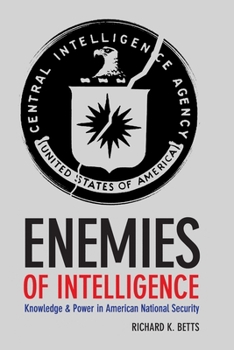Enemies of Intelligence: Knowledge and Power in American National Security
Select Format
Select Condition 
Book Overview
The tragic events of September 11, 2001, and the false assessment of Saddam Hussein's weapons arsenal were terrible reminders that good information is essential to national security. These failures convinced the American public that their intelligence system was broken and prompted a radical reorganization of agencies and personnel, but as Richard K. Betts argues in this book, critics and politicians have severely underestimated the obstacles to true reform.
One of the nation's foremost political scientists, Betts draws on three decades of work within the U.S. intelligence community to illuminate the paradoxes and problems that frustrate the intelligence process. Unlike America's efforts to improve its defenses against natural disasters, strengthening its strategic assessment capabilities means outwitting crafty enemies who operate beyond U.S. borders. It also requires looking within to the organizational and political dynamics of collecting information and determining its implications for policy. Combining academic research with personal experience, Betts outlines strategies for better intelligence gathering and assessment. He describes how fixing one malfunction can create another; in what ways expertise can be both a vital tool and a source of error and misjudgment; the pitfalls of always striving for accuracy in intelligence, which in some cases can render it worthless; the danger, though unavoidable, of "politicizing" intelligence; and the issue of secrecy--when it is excessive, when it is insufficient, and how limiting privacy can in fact protect civil liberties. Betts argues that when it comes to intelligence, citizens and politicians should focus less on consistent solutions and more on achieving a delicate balance between conflicting requirements. He also emphasizes the substantial success of the intelligence community, despite its well-publicized blunders, and highlights elements of the intelligence process that need preservation and protection. Many reformers are quick to respond to scandals and failures without detailed, historical knowledge of how the system works. Grounding his arguments in extensive theory and policy analysis, Betts takes a comprehensive and realistic look at how knowledge and power can work together to face the intelligence challenges of the twenty-first century.Format:Paperback
Language:English
ISBN:023113889X
ISBN13:9780231138895
Release Date:March 2009
Publisher:Columbia University Press
Length:264 Pages
Weight:0.80 lbs.
Dimensions:0.6" x 5.7" x 8.7"
Grade Range:Postsecondary and higher
Customer Reviews
1 rating
A View From the Top
Published by Thriftbooks.com User , 18 years ago
This book seeks to balance the deluge of criticism that has been directed towards the U.S. Intelligence System (especially CIA) with a more sympathetic view of how the U.S. intelligence process works. Its author, Richard K. Betts is a recognized scholar specializing in national security issues who has held a variety of positions on the fringes of the U.S. Intelligence Community. This scarcely makes Betts an expert on intelligence processes, although he seems to accurately reflect the views of the senior executives who occupy the highest levels of that Community. For this reason this is a valuable book. Betts identifies three categories of intelligence which he characterizes as: attack warning; operational evaluation; and defense planning. These are essentially military intelligence subjects and apparently he never considered the value to policy makers of economic, political, or technical intelligence. He also conflates warning with prediction even after reading Cynthia Grabo's book on Warning Intelligence. As he should know but does not, it is virtually impossible to predict the occurrence of discrete events, but entirely possible to provide warnings and risk assessments of potential threats. He also clearly has no real understanding of subject matter expertise (also known as target knowledge) as key to sound analysis. Betts attempts to defend a number of CIA's alleged failures. For example, there is his defense of the CIA WMD NIE that was published prior to Operation Iraqi Freedom. According to Betts, CIA analyst determined that ambiguous aluminum tubes were to be used as centrifuges and other principal intelligence agencies agreed with this conclusion. This is debatable, but more importantly he offers no evidence that any effort was made to determine if Iraq had acquired or was attempting to acquire the other components required to build centrifuges. As it turned out there are many uses for aluminum tubes. Then there is the issue of Iraqi biological weapon production. Betts informs the reader that in addition to the infamous and bogus German asset "Curveball", CIA had access to three other corroborating sources although two of these were also bogus. More to the point again CIA evidently made no effort to find independent verification of this claim. Its analysts could have asked outside experts about the technical details of the reports they had and they could have looked for supporting evidence such as Iraqi attempts to acquire containment technology or approaches to pharmaceutical firms for large amounts of antidotes (if you are going to use biological agents on the battlefield you had better be sure your own troops won't be stricken). Such omissions are inexcusable. It is a sobering experience reading Bett's discussions of reform and analysis as applied to the U.S. Intelligence System. He clearly seeks to portray major reform as both unnecessary and dangerous. Further, his understanding of intelligence analysis and production is that of






